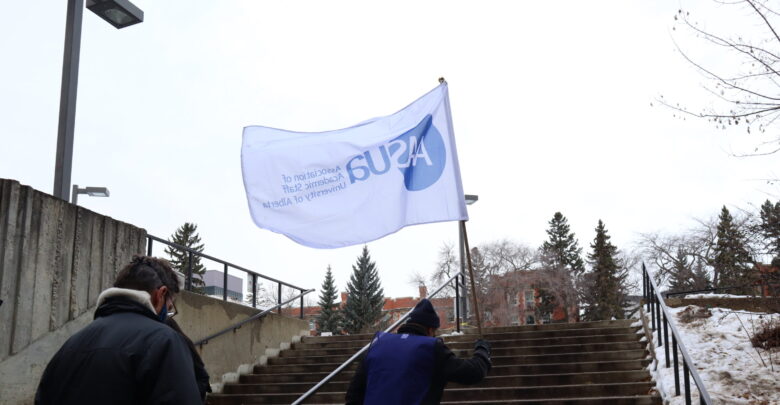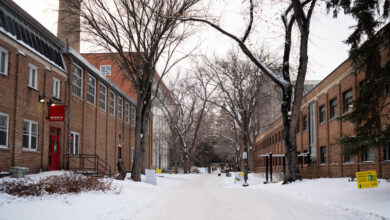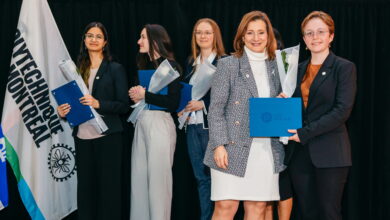AASUA intent on strike vote after negotiations break down
“We will not willingly lose that which we have built, and which we can provide to the students,” Gordon Swaters, AASUA president, says.
 Emily Williams
Emily WilliamsOn September 19, the Association of Academic Staff at the University of Alberta (AASUA) declared an impasse in its bargaining with the U of A. AASUA represents about 4,000 academic staff at the U of A, including academic teaching staff, faculty, librarians, administrative professionals, and researchers.
AASUA released a statement on its website on September 19 regarding the latest round of bargaining and its intention to hold a strike vote after the 14-day cooling off period.
According to AASUA’s media release, this is the first time the association has declared an impasse during collective bargaining and the first time it will go to a supervised strike vote.
At the end of the cooling off period, AASUA can hold a supervised strike vote. It will not necessarily result in an immediate strike. Under Alberta’s labour relations law, unions must give the employer 72-hour notice of its intention to strike.
Similarly, the employer can vote to lock-out employees after the cooling off period and must give 72-hour notice to employees.
If a majority of members vote in favour of a strike, it can happen anytime within 120 days of the vote. The same rules apply for a lock-out.
The university said in a statement sent out to the U of A community that it is ready to continue negotiations and “will not be deterred from working toward a fair and sustainable agreement.”
AASUA President, Gordon Swaters, said in an interview that the union is also prepared to continue bargaining if the university brings a serious offer to the table.
“We’re sending a signal to the university: ‘start taking bargaining seriously,’ because they haven’t been,” Swaters said.
AASUA says it took the intervention of mediator to get progress on salary negotiations
The U of A and AASUA have been in negotiations for a new collective agreement since January 17, 2024. Salaries, job security, and benefits have been at the centre of negotiations.
The latest round of negotiations occurred in formal mediation, with a mediator supervising the process.
According to Swaters, progress has been made on the negotiation of members’ salaries, but this only happened when the mediator was present.
“It took the intervention of the mediator in the first two days we met with the [university] team to get the senior administration to even agree to give us those across-the-board increases of three per cent in each of the four years,” Swaters said in an interview.
He explained that this is the standard number seen in the public sector.
AASUA originally asked the university for a 17 per cent increase for academic staff across-the-board. The U of A initially offered a two per cent increase across-the-board in both the first and second year, and a 1.75 per cent increase in both the third and fourth year.
Swaters said AASUA got creative in its proposals to stay in line with the government mandate of three per cent for four years while “protecting members’ salaries from the effects of inflation.”
This includes things like adding extra steps to cap salary grids so staff of excellent performance can move up a step in the salary scale. Additionally, AASUA would like to see the university give all members a flat $4,000 across-the-board increase retroactive to 2024.
“[This] will more positively impact our members on lower salaries than it will for our high paid members, such as faculty,” he explained.
AASUA says university wants to rollback benefits plan, university denies this
The benefits plan was of particular contention in this recent round of bargaining.
According to Swaters, the university “is insistent on a plan to fund our benefits which will result in significant and drastic budget cuts as we go forward.”
Using the U of A’s budget forecast model, AASUA found that the proposed plan would result in a $20 million deficit in 2027–28.
Swaters said that would mean a 30 per cent reduction in the annual expenditure of the benefits plan.
In a statement sent out to the university community, the university said “AASUA’s description of a mutually agreed-upon funding structure is not accurate and is misleading. There is a shared responsibility between the AASUA and the university, as described in the collective agreement, to ensure the financial sustainability of the benefits plans.”
“The university resists, repeatedly, every effort to get serious about bargaining until they’re dragged kicking and screaming by the mediator to the table,” Swaters said.
“It’s a complete misrepresentation of how bargaining is done,” Swaters says
The statement from the university stated that AASUA declared an impasse and “prematurely ended the mediation process, effectively cancelling the two scheduled October mediation dates and halting constructive dialogue.”
The university also said that it has made “clear efforts to respond to the union’s shifting priorities.”
“Instead of engaging, AASUA chose not to provide a counterproposal and walked away from the bargaining table,” the statement said.
Swaters refuted that in an interview with The Gateway.
“It’s a complete misrepresentation of how bargaining is done. We haven’t walked away from the bargaining table.”
Swaters said the union is still sitting at the bargaining table, “waiting for [the university] to come up with a realistic proposal to fund our benefit plan.”
He said AASUA exercised its constitutional right to declare that bargaining was at an impasse to start the “clock ticking toward a strike vote. That is not the same thing as walking away from the bargaining table.”
Swaters said the vote will give the union’s members a chance to vote on whether or not they believe that they want to defend the benefit plan.
“You want to know if we are really representing the members, you’re going to find out,” Swaters said.
“I find it despicable and deeply disappointing that the senior administration at this university would resort to essentially lies in order to advance their agenda of trying to take a wrecking ball to our benefits plan,” he added.
“We will not willingly lose that which we have built,” Swaters says
The U of A’s statement states that a labour disruption “would seriously and unnecessarily harm faculty, staff, students, and the broader university community.”
When asked what message he would send to students’ concerns about how a strike may affect their education, Swaters said academic faculty and staff have built up the U of A over the years and are trying to protect it.
Swaters said that not offering competitive compensation and benefits puts the U of A’s great teaching and research opportunities at risk.
“We will not willingly lose that which we have built, and which we can provide to the students,” he said. “We may have to engage in job action to preserve and protect what we have built together.”
The Gateway requested comment from the U of A and was sent a copy of the U of A’s public statement.




